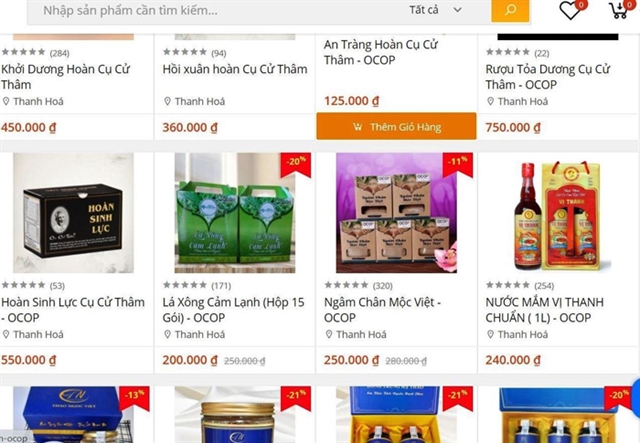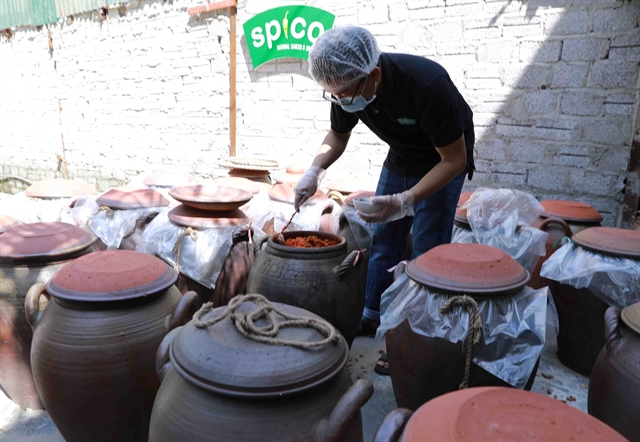 Economy
Economy

 |
| Many OCOP products of Thanh Hóa are sold on e-commerce platforms. — File Photo |
HÀ NỘI — Thanh Hóa Province was strengthening measures to promote the sustainable development of local products within the One Community, One Product (OCOP) programme, including selling products via e-commerce platforms.
Considering OCOP an important lever for rural economic development, Thanh Hóa has developed 317 OCOP products during the past four years, becoming one among leading localities in terms of OCOP product development. There are also five points of sale for the province’s OCOP products.
Cao Văn Cường, director of the provincial Department of Agriculture and Rural Development, said that Thanh Hóa is increasing the application of information technology and digital transformation in the implementation of the OCOP programme, especially promoting online sales.
OCOP products are distributed not only via traditional channels but also via websites, social networks and e-commerce platforms such as Lazada, Shopee, Tiki, Vỏ Sò and Postmart.
More than 100 OCOP products are sold on e-commerce platforms, 66 of which are brought to Postmart.vn and 38 per cent to Voso.vn.
Besides, promotions via digital platforms are also increased for hundreds of products.
Products with good online sales include Lê Gia fish sauce, Lê Gia shrimp paste, Thanh Hóa fermented pork rolls, Sâm Báo Wine, bird’s nest, high-class bamboo relaxing chair, Hà Yên shrimp paste, Xuân Liên dried bamboo shoot, rice, lemongrass essential oil and cinnamon sticks.
“Promoting the consumption of agricultural products on e-commerce platforms contributes to building brand and expanding markets for OCOP products,” Cường said.
According to Thanh Hóa Province's Coordination Office of the National Targeted Program on New Rural Development, the OCOP programme aimed to help enterprises, establishments and households have the opportunity to establish linkage from production to consumption, improve product quality and design, as well as expand production and increase value.
 |
| The logo of new rural area development. |
To increase value for OCOP products, Thanh Hóa promotes the application of technology and digital transformation during the implementation of the programme, and selling via e-commerce platforms has proved to be the most effective measure.
The province continues to update and promote products with large potential and competitive advantage on the website introducing local farm produce with the goal of “Accompanying Vietnamese people to elevate Vietnamese agricultural products” at the address chuyendoiso.thanhhoa.gov.vn.
Of note, the provincial agriculture department coordinated with relevant departments, including Industry and Trade; and Information and Communications, to strengthen digital transformation and bring OCOP products to e-commerce platforms, an impetus to improve productivity, quality, efficiency and consumption.
Besides, communications are also promoted to guide businesses, cooperatives and farms to install and use software to standardise production processes, helping to increase productivity, quality and information transparency, as well as facilitate coding and QR stamping for origin traceability.
Develop strong brands for OCOP products
 |
| Chilli sauce produced by Spico Company in Thanh Hóa Province. OCOP products must continue to improve quality towards international standards to increase exports by establishing value chains and increasing the application of digital transformation. — VNA/VNS Photo Vũ Sinh |
With the target of implementing the OCOP programme based on the unleashing of potential and advantages of rural areas, contributing to raising income and restructuring the agricultural sector in association with the development of handicraft, services and rural tourism, the focus would be turning OCOP products of the province into strong brands in the domestic market.
According to Bùi Công Anh, deputy head of the provincial Coordination Office of the National Targeted Program on New Rural Development, one of the prioritised solutions was to improve the efficiency of the programme management and implementation. In particular, the focus would be on improving mechanisms and policies for product development, increasing communications and branding, tightening supervision on product quality, food hygiene and safety, and environmental protection.
As production remains the important base to achieve the goals of the OCOP programme, Thanh Hóa would focus on organising production in line with the development of areas for raw material with the priority on developing infrastructure for these areas, granting codes for plantation areas, promoting organic production and eco-agricultural production.
Further, OCOP products must continue to improve quality towards international standards to increase exports through establishing value chains and increasing the application of digital transformation.
Deputy Chairman of the provincial People’s Committee Lê Đức Giang said that to increase the efficiency of the OCOP programme, it was important to evaluate and rank OCOP products in accordance with the established criteria.
He urged local authorities to accompany producers in the journey to improve product quality and expand the reach not only in the domestic market but also international markets.
According to the provincial Steering Committee for the Implementation of National Target Programmes, although OCOP products have been widely recognised the development of brands and supply chains have not been given adequate attention.
Minister of Agriculture and Rural Development Lê Minh Hoan said that OCOP producers must establish a difference from typical indigenous values.
“Many places in Thanh Hóa are associated with historical and cultural traditions which will create an uniqueness. The province needs to take advantage of these values to create typical OCOP products to spread the differences in culture, history and emotion,” he said.
“In other words, Thanh Hóa must tell the story of its culture through OCOP products. It is also a journey to bring local culture and knowledge to customers.”
Creating a stable consumption market is also important, Hoan said, urging producers to have plans to go ahead of trends and meet the tastes of not only domestic but also foreign consumers.
“Currently, there are so many similar products on the market for people to choose from such as fish sauce and honey. Therefore, we need to think together to create products with different value, advantages and competitiveness. If we cannot do this, it will be difficult for Thanh Hóa OCOP products to get the attention of consumers.” — VNS




